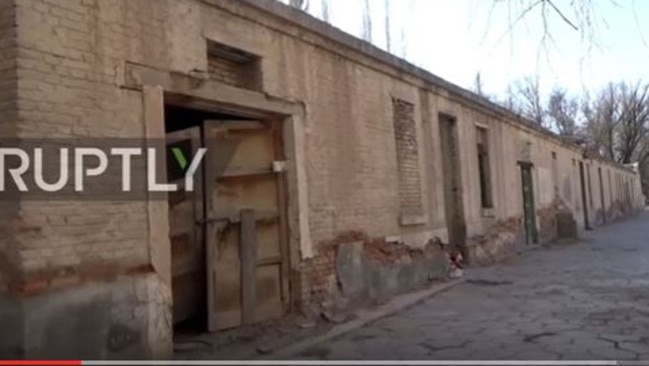Inside 404: Video footage reveals abandoned buildings inside once-busy nuclear city
IT WAS once home to an estimated one million people with parks, zoos and apartments. Now video reveals inside China’s top secret, abandoned nuclear city known only as 404.

World
Don't miss out on the headlines from World. Followed categories will be added to My News.
CHILLING footage has emerged showing the abandoned remains of a Chinese city used to build nuclear bombs known only as ‘404’.
The video shows buildings which have fallen into disrepair with whole streets remaining empty and overgrown by weeds in the town that was built in 1958. The secret location in northwestern China’s Gansu province near the Gobi desert is reportedly missing from any map, with the facility established to become China’s base for building nuclear bombs. It was reportedly home to up to one million people in the 1990s, many of whom where top nuclear experts recruited to work there. It was named after a company owned by the China National Nuclear Corporation, The Mirror reports but has since been abandoned with residents moving to another city close by. A statue of former Communist Party Chairman Mao Zedong dominates the town square and it also contains former apartments, a railway line, shops and a zoo. Former resident Li Yang grew up there in the third generation of a family that lived there and said “you will never find the town on any map”. He claimed in a blog post the four square-kilometre area had a court, government, media, school and “anything else you want from a city”, along with the “first military nuclear reactor in China”. “The first generation of 404’s residents was also its builders. They are the best of every walk of life, chosen by the government from across the country to work together for China’s first atomic bomb, an important weapon for a country desperate to ensure its security from the United States and the former Soviet Union,” he wrote. “404 is an extremely dry and windy place. The days are glaringly sunny. We are happy when it is cloudy. All families know each other in at least three generations. Children in the same age are like siblings.” “To outsiders, 404 residents’ life was dull. Roasting potatoes and watching stars were the main way to kill time for children, in addition to doing sports. 404 had a dry skating arena, where boys fought for beautiful girls. Some people are still in the 404 prison because of gang fighting.” The video of the town is a poignant reminder of China’s military aspirations which are undergoing a new phase following the country’s economic boom. This week China announced its only aircraft carrier, the Liaoning, would travel to the Pacific for the first time while the new FC-31 fighter had a debut test flight. The show of strength comes ahead of the inauguration of US President-elect Donald Trump who recently broke four decades of protocol by accepting a call from Taiwanese President Tsai Ing-wen, even though China objects to any official contact between its foreign partners and leaders of Taiwan. China is opposed to self-ruling Taiwan making any moves towards independence and the practice manoeuvres were noted by Taiwan’s defence minister who said “the threat from our enemy is increasing day by day.” A Chinese government official recently made headlines by quoting a poem by founder of Communist China Mao Zedong when speaking about independence movements in Taiwan and Hong Kong that are gaining support. China’s policymaking Taiwan Affairs Office spokesman An Fengshan said: “A small coterie of Taiwan independence forces are trying in vain to link up with Hong Kong independence (forces) to split the country, which cannot succeed.” “It’s just like that saying ‘On this tiny globe, a few flies dash themselves against the wall’,” he said — quoting the 1963 poem by Mao with lines usually taken to mean that China does not fear its enemies. “In the end they’ll find themselves broken and bleeding,” he added using words that are not in the poem. - With wires
Originally published as Inside 404: Video footage reveals abandoned buildings inside once-busy nuclear city



